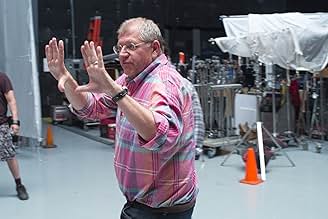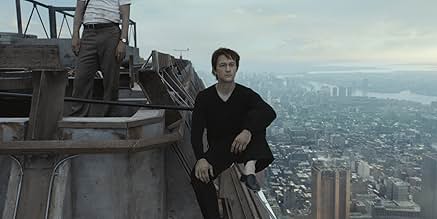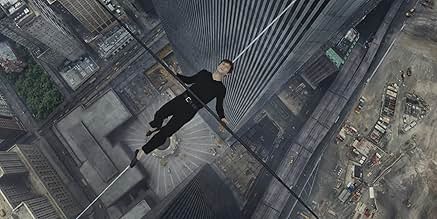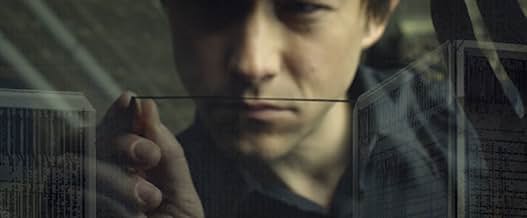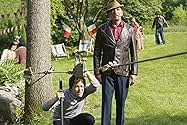Em 1974, o artista plástico Philippe Petit recruta uma equipe de pessoas para ajudá-lo a realizar seu sonho: caminhar no imenso vazio entre as torres do World Trade Center.Em 1974, o artista plástico Philippe Petit recruta uma equipe de pessoas para ajudá-lo a realizar seu sonho: caminhar no imenso vazio entre as torres do World Trade Center.Em 1974, o artista plástico Philippe Petit recruta uma equipe de pessoas para ajudá-lo a realizar seu sonho: caminhar no imenso vazio entre as torres do World Trade Center.
- Prêmios
- 3 vitórias e 17 indicações no total
- Outdoor Café Woman
- (as Emilie Leclerc)
- Direção
- Roteiristas
- Elenco e equipe completos
- Produção, bilheteria e muito mais no IMDbPro
Enredo
Você sabia?
- CuriosidadesPhilippe Petit personally trained Joseph Gordon-Levitt how to walk on a tightrope. When the training started, Petit predicted that Gordon-Levitt would need no more than eight days of training to be able to walk on a wire alone, which came true.
- Erros de gravaçãoWhen practicing the line shoot via bow and arrow in France, the distance needed is clearly marked and Phillipe dances in celebration when the arrow surpasses it. Not long thereafter - with the group in New York - Phillipe has to pull a press conference ruse to get that same distance information. Furthermore, even if he hadn't already made his calculations back in France, it is as simple as measuring the distance at the base.
- Citações
[first lines]
Philippe Petit: "Why?" That is the question people ask me most. Pourquoi? Why? For what? Why do you walk on the wire? Why do you tempt fate? Why do you risk death. But, I don't think of it this way. I never even say this word, death. La mort. Yes of okay, I said it once, or maybe three times, just now... But watch, I *will* not say it again. Instead, I use the opposite word. Life. For me, to walk on the wire, this is life. C'est la vie.
Philippe Petit: [now standing in the torch of the Statue of Liberty] So, picture with me it's 1974, New York city, and I am in love with two buildings - two towers. Or as everyone in the world will calls them, the Twin Towers of the World Trade Center. They call to me. These towers, they stir something inside of me, and they inspire in me a dream. My dream is to hang a high-wire between those twin towers, and *walk* on it! Of course, uh, this is impossible, not to mention, illegal. So, why attempt the impossible? Why follow your dream? But, I cannot answer this question why, not with words. But I can show you how i happened. And so, we must go back in time, and across the ocean, because my love affair with these beautiful towers did not begin in New York. In case you couldn't tell, I'm not from here. No, my story begins in another one of the world's most beautiful cities, se Paris.
- Trilhas sonorasDouce Candy
Adaptation of "Sugar Sugar"
Written by Jeff Barry and Andy Kim
Adapted by Arlette Kotchounian
Performed by Claude François
Courtesy of Mercury Records France
Under license from Universal Music Enterprises
Petit's story has become widely known and discussed thank to "Man on Wire," a fantastic 2008 documentary that outlines in detail the how and why of his fearless act. Robert Zemeckis's "The Walk," however, is a well-made, thematically significant account of the events, told within the boundaries of a biopic that takes an introspective, fourth-wall-breaking look at how Petit accomplished what he did.
Petit is played by Joseph Gordon-Levitt, who stands atop The Statue of Liberty whilst telling this unfathomable story. From the first scene, showcasing Petit on the statue, one will immediately detect a strangeness in Gordon-Levitt's French accent. The man who we recently saw proudly boasting and owning a full-bloodied Italian accent has now adopted a rather hammy French accent that occasionally treads the line of self-parody. This is the film's first, and really only, obstacle; if you can get past this, your enjoyment of the film will likely be pretty high. If you can't overlook this, I wish you the best one-hundred and twenty minutes.
The film follows Petit's humble beginnings on the streets of France as a young troubadour, from performing as a street-mime and meeting Annie (Charlotte Le Bon), a singer who performs in the streets as well, who will eventually be an accomplice to his high-wire act in New York City, to becoming an ambitious wire-walker. He enlists in the help of Papa Rudy (Ben Kingsley), a famous tightrope walker in the circus, who agrees to help him accomplish his dreams, albeit reluctantly so. The remainder of the latter half of the film concerns the extensive planning and development of Petit's plan to walk the rope between the Twin Towers and subsequently carrying out his actions.
Audiences sold by the film's series of daring and ambitious trailers may be shocked to note how much goes into the exposition of the buildup and around-the-clock planning of the walk itself. By the hour mark, I was beginning to question why Zemeckis, a known "visualist" in Hollywood, responsible for gems like "Back to the Future" and "The Polar Express," was chosen to direct a film that was so narrative-driven. But then, as quickly as the film began, the scenes atop the World Trade Center did, and in a way, allowed the real film to finally start as a result. When one sees how magnificent and captivating the scenes surrounding Petit's walk is when they'll see Zemeckis's artistic vision; it was an event so unspeakably tranquil yet suspenseful that I couldn't help but feel my palms sweat. The way Zemeckis and cinematographer Dariusz Wolski - who intently focuses on clouds and atmospheric naturalism during the walk - wrap the audience up in the awe-inspiring risk and inherent danger that comes with this event makes the film transcend fiction in a way that has the ability to give audiences a real experience. So few films do that that it becomes petty to complain about something like the weakness of Gordon-Levitt's accent.
On a thematic note, however, "The Walk" is a fascinating look at the ideas of optimism and courage that have ostensibly become interwoven in the fabric of American society of the years. The Twin Towers, in the film and in real-life, represented financial stability and international connectedness, and Zemeckis works to emphasize it in a way that spells out loving respect more-so than it does imminent disaster. The towers are viewed as a simple of untold bravery, much like Petit, and "The Walk" reminds us of a time period that still had the remainder of the world looking to America as a place of impossible achievement.
Zemeckis does a wonderful job at blending drama with visuals here, much like he did in his last film "Flight," a brilliant drama that came unfairly branded as both a disaster film and a courtroom drama. With "The Walk," Zemeckis takes empathy-inspiring visuals and themes of American exceptionalism and makes them function in a manner that is germane to the film's inherent aura of wonder. If you want it broken down in a simplistic manner, however, its delightful cinematic qualities and breathtaking visuals justify the ticket-price.
- StevePulaski
- 9 de out. de 2015
- Link permanente
Principais escolhas
Everything New on Hulu in January
Everything New on Hulu in January
- How long is The Walk?Fornecido pela Alexa
Detalhes
- Data de lançamento
- País de origem
- Central de atendimento oficial
- Idiomas
- Também conhecido como
- The Walk
- Locações de filme
- Empresas de produção
- Consulte mais créditos da empresa na IMDbPro
Bilheteria
- Orçamento
- US$ 35.000.000 (estimativa)
- Faturamento bruto nos EUA e Canadá
- US$ 10.137.502
- Fim de semana de estreia nos EUA e Canadá
- US$ 1.560.299
- 4 de out. de 2015
- Faturamento bruto mundial
- US$ 61.181.942
- Tempo de duração2 horas 3 minutos
- Cor
- Mixagem de som
- Proporção
- 2.39 : 1







